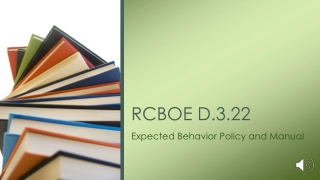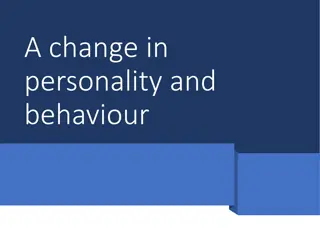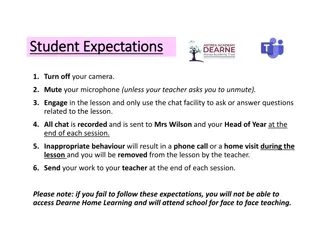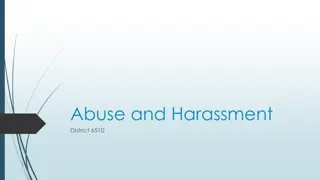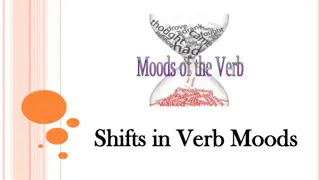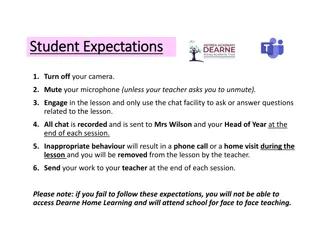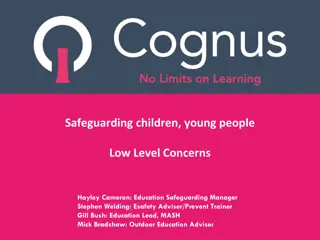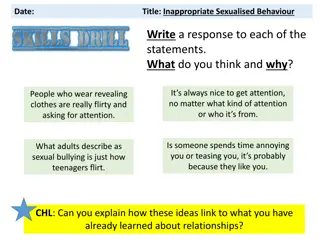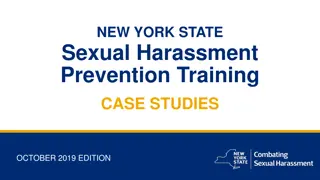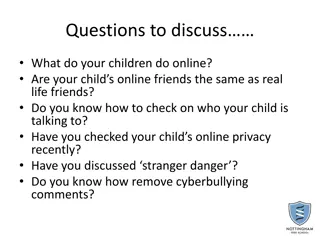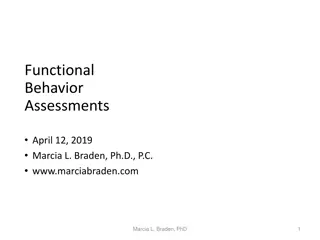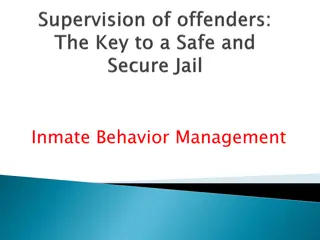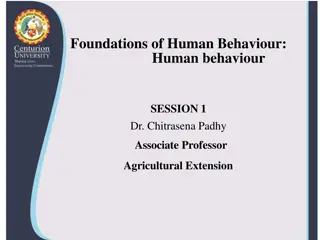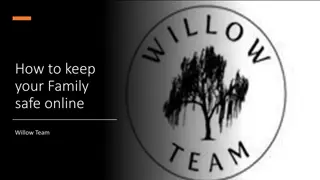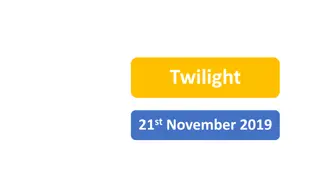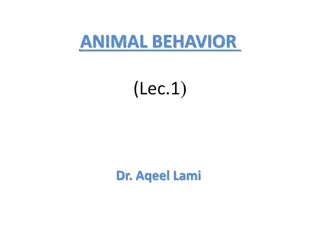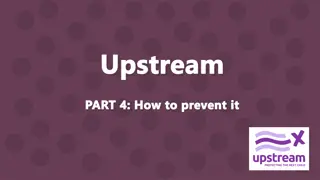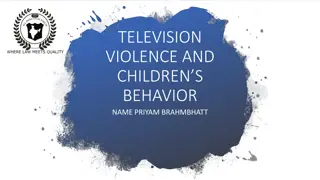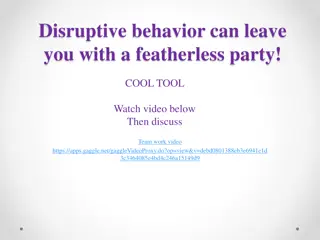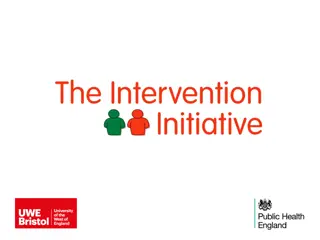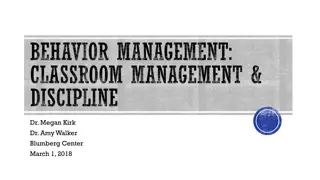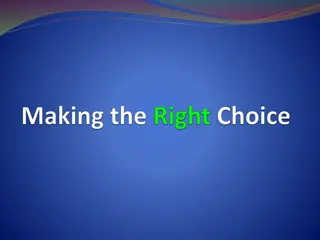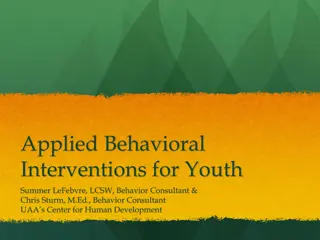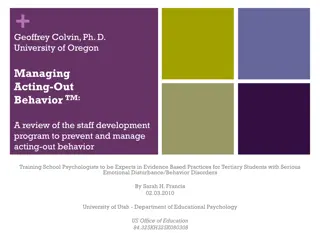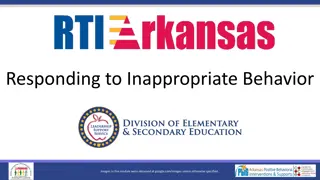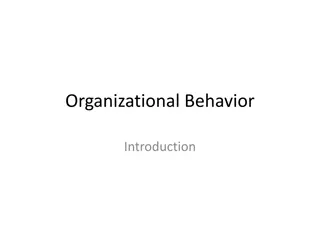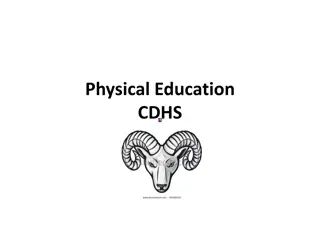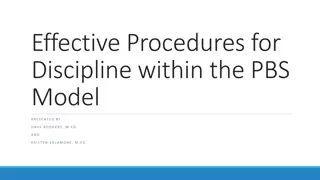RCBOE D.3.22
Establishes behavioral guidelines for safe & supportive schools, setting disciplinary standards & promoting body safety education for K-12 students. School officials ensure student welfare & orderly environments. Different levels of inappropriate behavior categorized with intervention strategies.
1 views • 13 slides
Function Based Thinking
Function-based thinking in Missouri Schoolwide Positive Behavior Support, emphasizing data-based decision-making, mission clarity, and effective teaching practices. Understand how behavior is related to the environment and how environmental interventions play a key role in shaping expected behaviors
6 views • 27 slides
Addressing Predatory Behavior in the Fellowship
Predatory behavior, especially towards vulnerable members, is a concerning issue in the fellowship. This behavior includes unwelcome advances, exploitation of power dynamics, and institutional sexism. The discussion on predatory behavior necessitates honest dialogue and a united approach for a safer
3 views • 13 slides
Understanding Workplace Bullying and Its Impact
Workplace bullying, defined as repeated inappropriate behavior undermining dignity, is a prevalent issue with significant economic and health consequences. The code of practice emphasizes the importance of addressing bullying to enhance mental wellbeing and productivity. Employers, employees, and re
2 views • 20 slides
Understanding Frontotemporal Dementia: A Case Study of Margaret
Margaret, a 61-year-old woman, is exhibiting symptoms suggestive of behavioral variant frontotemporal dementia (FTD). Her changing personality, inappropriate behavior, and memory issues are signs of FTD. This type of dementia involves frontal and temporal lobe degeneration, leading to alterations in
1 views • 32 slides
Student Expectations and Novel Study Activities
Guidelines for online learning set by Mrs. Wilson including camera and mic use, chat conduct, and consequences for inappropriate behavior. Additionally, tasks related to the novel involving definitions of anarchy, primal, savagery, civilization, and democracy, a reflection on leadership, and an exce
1 views • 13 slides
Guidelines for Preventing Abuse and Harassment in District 6510
District 6510 is dedicated to ensuring the safety and well-being of all participants by maintaining a zero-tolerance policy towards abuse and harassment. The Rotary International's policy emphasizes creating a harassment-free environment where dignity and respect are prioritized. Harassment is broad
8 views • 25 slides
Correcting Inappropriate Shifts in Verb Moods
Inappropriate shifts in verb moods can confuse readers and obscure the meaning of sentences. This article provides examples of incorrect shifts and their corrections, emphasizing the importance of maintaining consistency in verb moods within a sentence.
0 views • 13 slides
Online Learning Expectations for Students
Students are expected to follow specific guidelines during online learning sessions, including turning off cameras, muting microphones, engaging in lessons, using chat for relevant questions, and submitting work. Inappropriate behavior may result in intervention, and failure to adhere to expectation
0 views • 11 slides
Understanding Low Level Concerns in Safeguarding Children and Young People
Safeguarding children and young people involves addressing low level concerns, which may not meet harm thresholds but still require attention. Examples include inappropriate behavior towards children and breaches of conduct. The importance of setting out policies for low level concerns is highlighte
0 views • 18 slides
Understanding Consumer Behavior in Marketing
The design of a marketing program starts with understanding consumer behavior. Consumers, as the end users, play a crucial role in shaping market trends. Producers seek insights into consumer personas, market behaviors, and influencing factors. Management focuses on the consequences of consumer beha
2 views • 26 slides
Understanding Psychology: The Science of Behavior and Mental Processes
Psychology is the scientific study of behavior and mental processes. Psychologists study both observable behavior and private mental processes. The primary goals of psychology are to describe, understand, predict, and control behavior. Different branches of psychology, such as applied psychology, cl
2 views • 29 slides
Understanding and Addressing Inappropriate Sexualized Behavior
This educational content explores the concept of sexual bullying, inappropriate sexual behavior, and how to challenge and resist it. It delves into societal misconceptions about attention-seeking and links them to real-life scenarios discussed in the material. It also provides guidance on responding
0 views • 8 slides
Addressing Sexual Harassment in the Workplace: Case Studies October 2019 Edition
This content discusses a case study involving Li Yan and her coworker Ralph, highlighting issues of unwanted advances and persistence. Despite initially going on a date, Ralph's continuous pressure and inappropriate behavior towards Li Yan demonstrate a clear case of sexual harassment in the workpla
0 views • 67 slides
Internet Safety Tips for Parents: Keeping Your Child Safe Online
The online world poses various risks for children, from cyberbullying to exposure to inappropriate content. Parents need to be vigilant and proactive in ensuring their child's safety while navigating the internet. Topics such as monitoring online activities, discussing stranger danger, and recognizi
0 views • 23 slides
Understanding Functional Behavior Assessments for Supporting Students
Functional Behavior Assessments (FBAs) play a crucial role in supporting students with behavioral needs by identifying the reasons behind inappropriate behaviors. This approach, led by professionals like Marcia L. Braden, Ph.D., helps define interventions, prevent problems, and teach alternative beh
1 views • 51 slides
Understanding Inmate Behavior Management in Correctional Settings
Inmate Behavior Management in correctional facilities involves supervising inmates, implementing corrective discipline, and fostering a fair and consistent environment. It emphasizes the importance of behavior management plans, identifying undesirable traits in supervision, and passing educational a
0 views • 19 slides
Understanding Human Behavior: Foundations and Factors
Human behavior is a multifaceted subject influenced by genetic makeup, culture, and individual values. It encompasses both overt actions and covert thoughts, a product of the individual and environmental factors. Psychologists study behavior from visible (overt) actions like playing football to inne
0 views • 20 slides
Understanding Normal and Abnormal Behavior: Perspectives and Definitions
Normal behavior varies from person to person and society, influenced by individual preferences and societal norms. Abnormal behavior is characterized by an inability to function effectively or personal discomfort. The concept of normality and abnormality in psychology raises complex questions about
2 views • 8 slides
Ensuring Family Online Safety: Key Issues and Solutions
Important facts about maintaining online safety for families include controlling account numbers, activating parental controls, and setting restrictions for both home and mobile data usage. Online safety issues range from cyberbullying to exposure to inappropriate content, requiring proactive measur
0 views • 41 slides
Positive Behavior Support in School: Dealing with Challenging Behaviors
Understanding and addressing challenging behaviors in school is crucial for creating a respectful and inclusive environment. This involves using appropriate management strategies, agreed consequences, and clear communication with staff, students, and parents. By teaching social behavior and ensuring
0 views • 29 slides
Green Belt Planning Guidelines and Inappropriate Development Overview
Green Belts serve key purposes in urban planning to curb sprawl, protect countryside, and preserve historic town settings. National policies like the NPPF emphasize the permanence and openness of Green Belts. Inappropriate development is heavily discouraged in Green Belts, with stringent criteria fo
2 views • 10 slides
Understanding Human Behavior: Insights for Social Workers
This material delves into the intricacies of human behavior, exploring factors influencing behavior such as heredity, environment, intelligence, needs, and motives. It covers the concept of human behavior, stages in life from conception to old age, and theories of human development by eminent psycho
2 views • 71 slides
Understanding Animal Behavior and Ecology
Animal behavior encompasses a range of activities such as feeding, breeding, and social interactions. Ethology focuses on studying behavior in natural environments, while behavioral ecology examines ecological aspects like predator-prey interactions. Sociobiology delves into the evolution of social
3 views • 5 slides
Recognizing Signs of Child Abuse and Preventing Harm
Children often exhibit signs of abuse through changes in behavior, and it is important for adults to be vigilant and proactive in identifying and addressing these signs. This includes watching for inappropriate behaviors, nightmares, withdrawal, secretive behavior, sudden personality changes, and mo
0 views • 28 slides
Impact of Television Violence on Children's Behavior
Television violence has a significant influence on children's behavior as they may become desensitized to violence and even mimic what they see on TV. Parents need to monitor and limit their children's TV viewing, engage in discussions, and block inappropriate content to protect them from negative e
0 views • 15 slides
Understanding and Addressing Disruptive Behavior in School: A Team Approach
Disruptive behavior in school can negatively impact the learning environment for everyone. This content provides insights into what disruptive behavior entails, why it is inappropriate, alternative actions to promote a safe learning environment, and emphasizes the importance of being a team player i
0 views • 5 slides
Promoting Healthy Social Norms in Group Settings
This program aims to foster healthy and positive social norms by discussing sensitive issues in a respectful manner. Ground rules like confidentiality and appropriate communication are set to ensure a safe space. Through understanding and addressing unacceptable behaviors, the goal is to create a cu
0 views • 31 slides
Understanding Behavior Management in Classroom Settings
Explore the essential topics of behavior management, classroom strategies, and discipline in educational settings. Delve into the functions of behavior, impact of trauma on learning, and effective management techniques. Learn how to identify underlying reasons for student behaviors, discuss behavior
0 views • 76 slides
School Behavior Expectations and Guidelines
Guidelines for behavior in different areas of the school, including classrooms, playground, dining hall, and assemblies. Emphasizes respecting staff and peers, following rules, demonstrating good manners, and collaborating with others. Consequences are specified for inappropriate behavior such as la
0 views • 15 slides
Targeting Emotions to Facilitate Behavior Change in Older Adults
Efforts in changing health behavior have traditionally focused on social and cognitive factors, but recent evidence highlights the importance of affective states in decision-making and behavior change. Janey Peterson discusses the role of emotions in achieving and sustaining behavior change to benef
0 views • 11 slides
Grading Criteria for Effort and Behavior in Educational Reporting
Effort and behavior in educational settings are evaluated based on criteria ranging from Excellent to Causing Concern. Pupils demonstrating excellent behavior show respect, responsibility, and positive engagement in learning. Those with good behavior exhibit cooperation and respect for others, albei
0 views • 9 slides
Understanding Applied Behavior Analysis (ABA) for Youth Interventions
Applied Behavior Analysis (ABA) is a science focusing on improving human behavior by increasing desired behaviors, teaching new skills, and generalizing behaviors. ABA emphasizes observable behaviors, measurement of behavior change, and the use of interventions in various settings like classrooms an
0 views • 25 slides
PBIS Expectations and Behavior Flowchart
The PBIS flowchart outlines behavior expectations and interventions for minor and major incidents in a school setting. It covers disrespectful behavior, disruption, defiance, property damage, theft, possession of weapons, and more. The flowchart guides teachers and staff on managing and addressing s
0 views • 6 slides
Managing Acting-Out Behavior: A Staff Development Program Review
This review discusses a staff development program created by Geoffrey Colvin, Ph.D., from the University of Oregon, focusing on preventing and managing acting-out behavior in students with emotional disturbance or behavior disorders. The program includes video presentations, strategies for behavior
0 views • 22 slides
Effective Strategies for Managing Inappropriate Behavior
Building on a proactive approach, this module discusses the importance of focusing on prevention and effective management techniques for inappropriate behavior in various settings. The content emphasizes the need for clear behavioral expectations, consistent teaching of desired behaviors, and the de
0 views • 33 slides
Understanding Organizational Behavior and Individual Behavior
Organizational Behavior (OB) is a multidisciplinary field that combines knowledge from various disciplines to study and manage organizations effectively. It emphasizes the application of this knowledge to enhance organizational effectiveness and the well-being of participants. OB is a useful concept
0 views • 38 slides
Function-Based Behavior Support Plans: A Comprehensive Guide
Explore the process of developing Function-Based Behavior Support Plans (BSP) using Functional Behavioral Assessment (FBA). Understand the concepts of function and functional behavior assessment, learn how FBA/BSP fits within a multi-tiered support system, and practice developing BSP for students. D
0 views • 74 slides
Physical Education Grading Policy and Procedures at CDHS
Physical Education at CDHS follows a detailed grading policy where each class is worth 10 points. Points are earned based on participation, effort, behavior, and adherence to rules. Deductions can occur for violations such as tardiness, inappropriate behavior, lack of participation, and disrespect o
0 views • 22 slides
Effective Procedures for Discipline within the PBS Model
Discipline within the PBS model focuses on promoting appropriate behavior, decreasing problem behaviors, and ensuring student success. It involves implementing steps, policies, and actions to support learning environments. Strategies include teaching social skills, addressing triggers of problem beh
0 views • 30 slides
